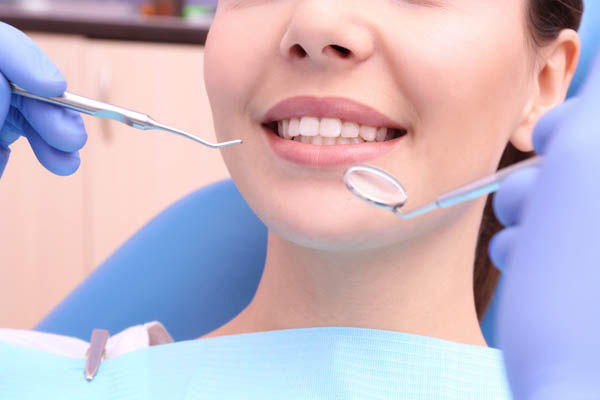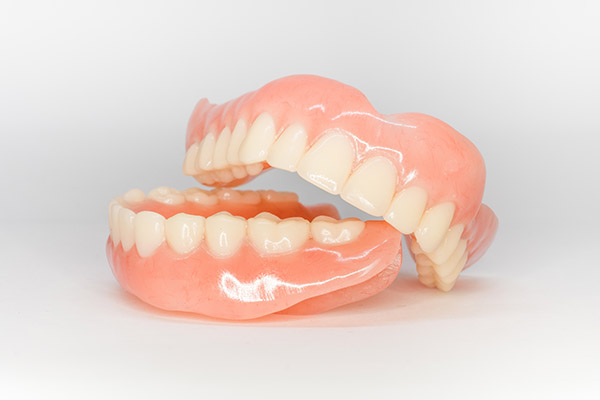Signs and Symptoms of Periodontal Disease

Periodontal disease, or gum disease, can be incredibly concerning and lead to other, more severe oral health issues if left untreated for an extended amount of time. Consequently, it is important to fully understand the various signs and symptoms of periodontal disease in order to be able to spot periodontal disease as soon as it develops and to seek prompt treatment.
Symptoms of periodontal disease
The symptoms of periodontal disease are usually progressive and have a fairly slow onset, which is why it is important to thoroughly check your gums on a routine basis. When checking the gums for symptoms of periodontal disease, look for the following common signs.
Swollen gums
The most prevalent symptom of periodontal disease — and the one that is usually the first to exist — is swollen gums. When the gums are subject to bacteria and other harmful substances, they become weak and vulnerable to infection, which causes them to swell. In addition to the swelling, the gums are likely to become a much brighter red in the early stages of periodontal disease, and more serious signs of periodontal disease are likely to follow in the absence of treatment.
Bleeding gums
Bleeding gums is one of the more well-known symptoms of periodontal disease. When gum disease develops, the gums almost always are vulnerable to bleeding during one’s daily care routine. If gums begin to bleed while brushing, flossing, or eating, it is important to visit the dentist for the diagnosis and effective treatment of periodontal disease to ensure the symptoms do not worsen.
Receding gums
Receding gums are a more serious symptom of gum disease that should be treated with a sense of urgency. While it is not indicative of any long-term effects, receding gums can quickly be followed by teeth becoming loose, which can cause a need for invasive dental procedures to avoid tooth loss. Receding gums makes the tooth appear longer, and it can often be hard to notice. Be sure to check for signs of receding gums each day, and visit the dentist if your gums are believed to be receding.
Bad breath
Gum disease is often caused by an accumulation of plaque and tartar — which contains bacteria — on the gums and gum line. When this buildup of bacteria occurs, it can give off a bad odor and cause bad breath. If bad breath exists with other symptoms of periodontal disease, a trip to the dentist for diagnosis and treatment is likely required.
Loose teeth
Periodontal disease can eventually lead to complete tooth loss if the earlier symptoms of periodontal disease are ignored and not properly treated. Before tooth loss occurs, however, the teeth will become loose, which usually takes place after the gums are weakened and recession of the gums occurs. If teeth are loose due to periodontal disease, it is incredibly important to visit the dentist as soon as possible to try and save the tooth from becoming lost, resulting in the need for expensive teeth replacement procedures.
Treatment options for periodontal disease
The recommended treatment option for periodontal disease depends on the stage in which it is diagnosed; gingivitis is far easier to treat than periodontitis. Here is a more detailed look at how a dental professional may treat periodontal disease.
Gingivitis treatment
Gingivitis is a less severe form of periodontal disease. Swollen gums, bleeding gums, and gum irritation are the most common symptoms of gingivitis. Since gum recession is not typically severe with gingivitis, it is easier to treat. Often, all that is necessary is improvements in the patient’s oral care routine and a routine dental cleaning. In other cases, an antibacterial mouthwash prescription and/or scaling and root planing procedure may be recommended.
Periodontitis treatment
Periodontitis is a progressive form of periodontal disease that most often causes gum recession and deep gum pockets. Periodontitis treatment usually begins with scaling and root planing; this cleans beneath the gum line to remove plaque and tartar. A gum graft procedure may also be necessary for severe gum recession. Deep gum pockets may need to be treated with pocket reduction surgery in more severe cases.
Are you experiencing symptoms of periodontal disease?
If you have symptoms of periodontal disease such as those discussed above, then we encourage you to call our office today to schedule a visit. We are more than happy to assist you in determining the status of your oral health and the best treatment plan for periodontal disease.
Request an appointment here: https://smilewellsouthbay.com or call SmileWell Family Dentistry at (310) 904-6375 for an appointment in our Torrance office.
Check out what others are saying about our dental services on Yelp: Periodontics in Torrance, CA.
Recent Posts
Periodontics is a specialized branch of dentistry that focuses on preventing, diagnosing, and treating diseases affecting the gums and other supportive oral structures. A periodontist can help patients manage periodontal issues, ranging from mild gum inflammation to advanced cases that require surgical intervention. This dental specialty can help you maintain your oral health and prevent…
Gum care is an important component of oral care. When gum problems arise, patients can often benefit from seeing a periodontist for advanced gum care. These dental providers diagnose and treat issues with the gums, delivering targeted care to preserve oral health and prevent further complications. Understanding the role of a periodontist and recognizing when…
Dentists recommend proper oral hygiene from a young age to achieve good dental health for a lifetime. This is important for cosmetic reasons, but also to maintain overall health. One of the consequences of not brushing and flossing correctly is gum disease, which is also known as periodontal disease. This condition originally affects the gums,…
Gum contouring or gum reshaping are other names for a receding gum lift, and this procedure, completed by a periodontist, restores a person's gumline to cover the tooth adequately. The process is usually recommended by a dental specialist if a person has suffered significant gum recession that has nearly exposed the tooth's root.When gum coverage…


